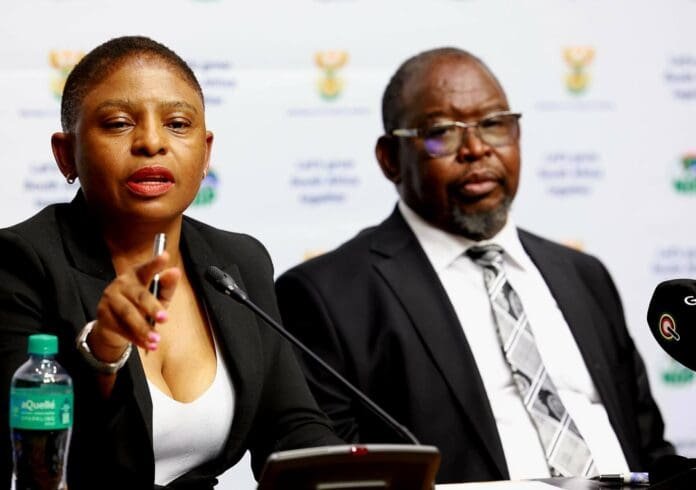Finance Minister Enoch Godongwana’s undelivered 2025 Budget Speech laid out a bold strategy aimed at cushioning South Africa’s most vulnerable citizens from economic hardship.
Central to his plans was a significant injection of R23.3 billion into social grants and welfare programs, along with an extension of the COVID-19 Social Relief of Distress (SRD) grant until March 2026.
However, the funding of these initiatives—amid growing fiscal pressures—was a complex balancing act, with proposals such as a 2% VAT increase and broader tax hikes looming in the background.
Major boost for social grants amid economic challenges
With over 25 million South Africans relying on social grants, Godongwana’s budget was set to provide substantial relief by increasing key grants, including those for old-age pensioners, child support, and foster care. These increases were designed to outpace inflation and mitigate the impact of rising living costs.
“Spending on social grants is allocated an additional R23.3 billion. This is to ensure that low-income households are not left worse-off by the increase to the VAT rate,” Godongwana had planned to announce.
The proposed budget increase was aimed at shielding the over 25 million social welfare beneficiaries from the proposed 2% VAT increase, which arguably would have left the poorest of the poor worse off.
The SRD grant: a lifeline for millions
A critical component of the budget was the extension of the COVID-19 Social Relief of Distress (SRD) grant for another year, costing R35 billion. Originally introduced in May 2020 as temporary assistance during the pandemic, the SRD grant now supports over 8 million unemployed South Africans.
Godongwana’s plan aligned with President Cyril Ramaphosa’s State of the Nation Address, which emphasised that the SRD grant would serve as the foundation for a more sustainable income support system for the unemployed.
“As announced by the President in the State of the Nation Address (SONA), the COVID-19 SRD will be used as a basis for the introduction of a sustainable form of income support for unemployed people,” Godongwana intended to state.
However, the exact long-term future of the grant remains uncertain, as the Treasury continues to evaluate alternative approaches through a review of active labor market programs. “The future form of the COVID-19 SRD will be informed by the outcome of the review of active market programs. This is expected to be completed by September this year,” he had planned to announce.
Funding challenges: where the money would come from
To finance these ambitious social spending initiatives, Godongwana had initially proposed a 2% increase in VAT, which would have generated an additional R58 billion. These funds were intended not only for social grants but also for revitalising the public railway system, hiring and retaining essential workers, and strengthening early childhood development programs.
However, a VAT hike is a politically sensitive issue, as it places additional financial strain on all consumers, particularly the poor.
At the same time, the recent North Gauteng High Court ruling added another layer of financial pressure. The court determined that the government had unfairly excluded millions of eligible SRD grant recipients, essentially mandating that the state expand the program. This forced Treasury to find additional revenue sources, potentially through further tax hikes or expenditure cuts elsewhere.
Democratic Alliance (DA) leader John Steenhuisen previously highlighted the unprecedented nature of the situation, stating, “We haven’t been helped as well by the recent court judgment on the SRD grant. It’s put significant pressure on the budget. I’ve never seen anything quite like it—budgeting through litigation, and it’s put us in a very, very tight spot as a result of that.”
Steenhuisen argued that instead of raising taxes, the government should focus on economic growth and structural reforms, such as privatizing key infrastructure. “We’ve got to do the bold, brave things like concessioning the Cape Town port, like concessioning rail,” he told EWN. “We musn’t just talk about it, let’s do it, because it’s these things that will become the catalytic growth opportunities for the country.”
What the budget means for grant recipients
For grant recipients, the proposed budget offers a measure of relief amid rising living costs. The R23.3 billion allocation to social grants will result in above-inflation increases to key grants, including the old age, child support, and foster care grants. These adjustments will help vulnerable households cope with the rising cost of food, transport, and other essentials.
The extension of the SRD grant until March 31, 2026, ensures that millions of unemployed individuals will continue to receive financial support. For many recipients, the R350 grant is a critical source of income that enables them to meet basic needs. However, while other grants are set to increase significantly—such as the old age grant, which will rise by R150 throughout the year (R140 in April and an additional R10 in October), and the child support grant, which will increase by R50 to R580 per month—no mention has been made of increasing the SRD grant to match inflation.
This has left many hoping that the SRD grant will eventually be adjusted to align with inflation, similar to other grants, to ensure its value is not eroded over time. Such an increase would provide even greater relief to the millions of South Africans who depend on this lifeline to survive.
2025 SASSA grants in a glance
For the millions of South Africans who depend on grants, Godongwana’s budget—if implemented—would have meant increased financial relief, particularly in response to inflation. The SRD extension provided continued support to the unemployed, though its long-term future remains uncertain.
In a nutshell, the proposed budget was a mix of good and bad news. More money for grants meant some relief for struggling households, but potential tax increases—especially VAT—could have made everyday goods more expensive.
The government has challenge was to balance social support with sustainable public finances, a task made even more difficult by legal pressures and a sluggish economy.

